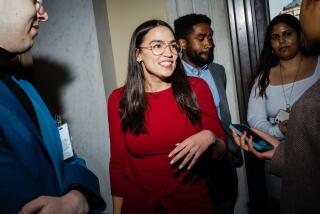Sandinistas, Indian Rebel Leader to Begin Peace Talks
- Share via
SAN JOSE, Costa Rica — Brooklyn Rivera, a leader of Nicaragua’s Indian rebels, is scheduled to head a 10-member delegation to Managua today for peace talks with the Sandinista government.
Rivera said the delegates expect to negotiate with members of the nine-member Sandinista National Directorate during their weeklong stay. They also plan, he said, to visit the isolated Atlantic coast region, where the Indians have been fighting since 1981.
“We are going to explore the objective conditions for advancing toward a solution for peace,” Rivera said. “I am sure this is what the people want, and if we were to do otherwise, I doubt our communities would follow us.”
Timing Criticized
Two of Rivera’s colleagues in the leadership of Yatama, an Indian rebel organization, criticized the timing of his trip. They said the Sandinistas would manipulate his visit to defeat a measure in Washington for U.S. aid to the anti-Sandinista Contras. Congress is scheduled to vote on the issue Feb. 3-4.
One of two, Wycliffe Diego, who has spent this week meeting with U.S. officials, told reporters in Miami that Rivera represents “a small minority” of the Indian combatants. He read a statement signed by him and Steadman Fagoth saying that Rivera will not be negotiating on behalf of the entire organization.
Fagoth, who was not present at the press conference, said by telephone from Miami that he is not opposed to negotiations.
“Brooklyn is going to see if there is political space in Nicaragua, and we support that objective,” Fagoth said. “What we don’t support is the strategy and what it means to talk to Ortega now, with the vote pending in Congress.”
Fagoth agreed with Rivera’s assessment that the Indian refugees and communities in Nicaragua are tired of the war. The rebels estimate that 25,000 Miskito, Sumo and Rama Indians are living in refugee camps and along the Coco River in Honduras.
Fagoth said the Indian combatants must seek an end to the fighting because they are short on funds and supplies.
“Our situation is chaotic,” he said. “We have a lack of logistical support. We only have enough to subsist, but not to grow.”
Rivera, Diego and Fagoth forged an alliance as the Yatama group last May after U.S. officials had threatened to cut off their aid if they did not unite. The leaders say they represent 2,400 combatants, but other sources say the number may be no more than half that.
Rivera charged that U.S. officials have tried to discredit the pending negotiations. He blamed them for a newspaper advertisement that appeared here last week calling the negotiating team “self-appointed leaders . . . motivated by petty, economic and personal ambitions.”
U.S. officials denied putting pressure on Rivera and said the advertisement was placed by renegade combatants angry with Rivera. They also said the rebels were well-funded. The Indians were allocated $5 million of the $100 million in U.S. aid to the rebels last year, and have received “the lion’s share of that,” according to a U.S. official in the region.
“They’ve got everything they need, and there is more on the shelves,” said a U.S. official who asked not to be identified by name. He said their Indians must improve their record-keeping and accounting systems to get the rest.
Rivera previously had accused U.S. officials of withholding aid to prevent their negotiating with the Sandinistas.
The three Indian leaders first announced that they planned to return to Nicaragua for negotiations last October under the peace accord signed in August by the five Central American presidents.
The October plan fell through when, at the last minute, Nicaragua’s interior minister, Tomas Borge, announced that the Indians would have to accept amnesty before they would be allowed to enter the country. The Indians refused, contending that they had committed no crimes and, therefore, needed no amnesty.
Borge laid down the amnesty condition in response to an announcement by Contra leaders that they would try fly into Managua to attempt negotiations on the coattails of the Indians’ visit.
No further move toward talks between the Indians and the Sandinistas occurred until last week, when President Daniel Ortega met with Rivera here while the five Central American presidents were reviewing progress on their peace plan. Ortega told the rebel leader that the Indians could now return to Managua without amnesty.
Rivera said that while in Managua, Borge would be the Sandinista official with whom he would talk.
“It is arranged,” he said.
Fagoth, when asked why he and Diego had changed their minds about taking part in the talks, said the Indian leadership should not “put all its eggs in one basket.” For his part, Diego said that when Borge changed the rules on them in October, it made him distrustful.
Diego also said that there can be no peace for the Indians unless there is peace in the entire country and that the Indians should coordinate with the larger, U.S.-backed Contra umbrella organization, the Nicaraguan Resistance.
More to Read
Sign up for Essential California
The most important California stories and recommendations in your inbox every morning.
You may occasionally receive promotional content from the Los Angeles Times.













